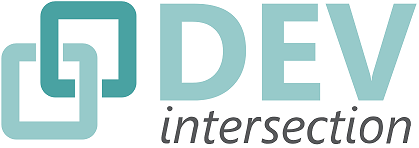
It's close to 32 degrees outside. Wind whipping at your coat. No you're not on a boat. But where are you? Admittedly that's a question with one too many answers, but I bet you wouldn't guess Las Vegas. DEVintersection 2018 was again, held in Las Vegas, Nevada at the MGM grand. And it was cold. Too cold my friends.
On top of that, I'm honestly not much of a gambler, so I spent much of my free time hopping from hotel to hotel, checking out the sites. Indoors. No matter! It was still a fantastic conference, and the theme did slightly change from that of last year.
If you recall my previous post on DEVintersection 2017, the theme was Docker and Microservices. It was a challenge to go to a session and be exposed to one or the other, even if the topic seemed like it was not related at all. While Docker and leveraging microservices are still being talked about, and are definitely not going anywhere, the theme this year definitely did shift.
The Theme
It may not be incredibly surprising to hear that much of the conference was focused around Artificial Intelligence. It's gaining some traction in the tech community.
This year DEVintersection explicitly co-located with the Microsoft Azure + AI Conference. Now, Co-locating is pretty common for DEVintersection, it's why they call it an intersection.. so I guess I shouldn't have been so surprised going into the con that a large portion of it would have AI related content!
The AI keynote highlighted customers that used Microsoft cognitive services to build customer support bots, notably Tobi. They showcased multiple demonstrations where it was near impossible to tell the difference between a two humans interacting with one another and a human interacting with a bot. Going as so far as to have the bot verbally speak. AI is going to have a huge impact in the customer service industry, even moreso than it does today.
Though the highlight of the AI keynote had to be a whiteboard compiler. Now, when they initially announced what they were going to do, I wasn't quite sure at what they were going to be ultimately doing. What the hell is a whiteboard compiler?
In the end, they drew an Azure DevOps pipeline on a whiteboard, took a photo of it, and then it was interpreted by Azure cognitive services to be turned into a usable deployment pipeline. From a whiteboard! A whiteboard I tell you!
So Much Auth
My current area of focus, at work anyway, has to do with identity management. That is, user management within an enterprise including editing users, access to applications, the whole shebang. So unsurprisingly, I spent a large chunk of the conference attending workshops and sessions that closely aligned with identity and access management. Which for the most part means I spent the entire week with Brock Allen and the Solliance team, it's pretty much all they do.
The irony of it all was that after spending two days in a workshop and attending a couple sessions all relating to OAuth and Identity/Access Management, Solliance held a Security After Dark meet and greet to field questions. One of the party goers had asked an OAuth implementation question, and through a number of back and forths the final response was "specifications are suggestions".
Here I was, ready to go back to my office ready to lay down the "obey the spec" hammer, all to be brought back down to earth that it doesn't necessarily have to be that way.
Honestly though, it was good to hear. All to often I get stuck in this mindset of needing to find the perfect answer, the answer that has no equal and is obviously the way to go. Unfortunately in our field, such answers rarely exist. You can't just follow the spec word and word and produce a great product, or guarantee that it's going to be portable. Not everyone is going to follow the spec exactly, and the spec itself in some areas is pretty vague.
Moral of my entire Auth journey at DEVintersection would simply be, don't be afraid to diverge from the spec. At least a little bit.
Why So Fast?
For me, the conference honestly was avoiding the cold and learning the ins and outs of the OAuth spec as well as how to implement it. Though with that said, this time around the conference seemed to go much quicker than the previous year. Maybe the new hotness wore off, or I'm getting more accustomed to conference going. Nevertheless, I'll be back again next year.
